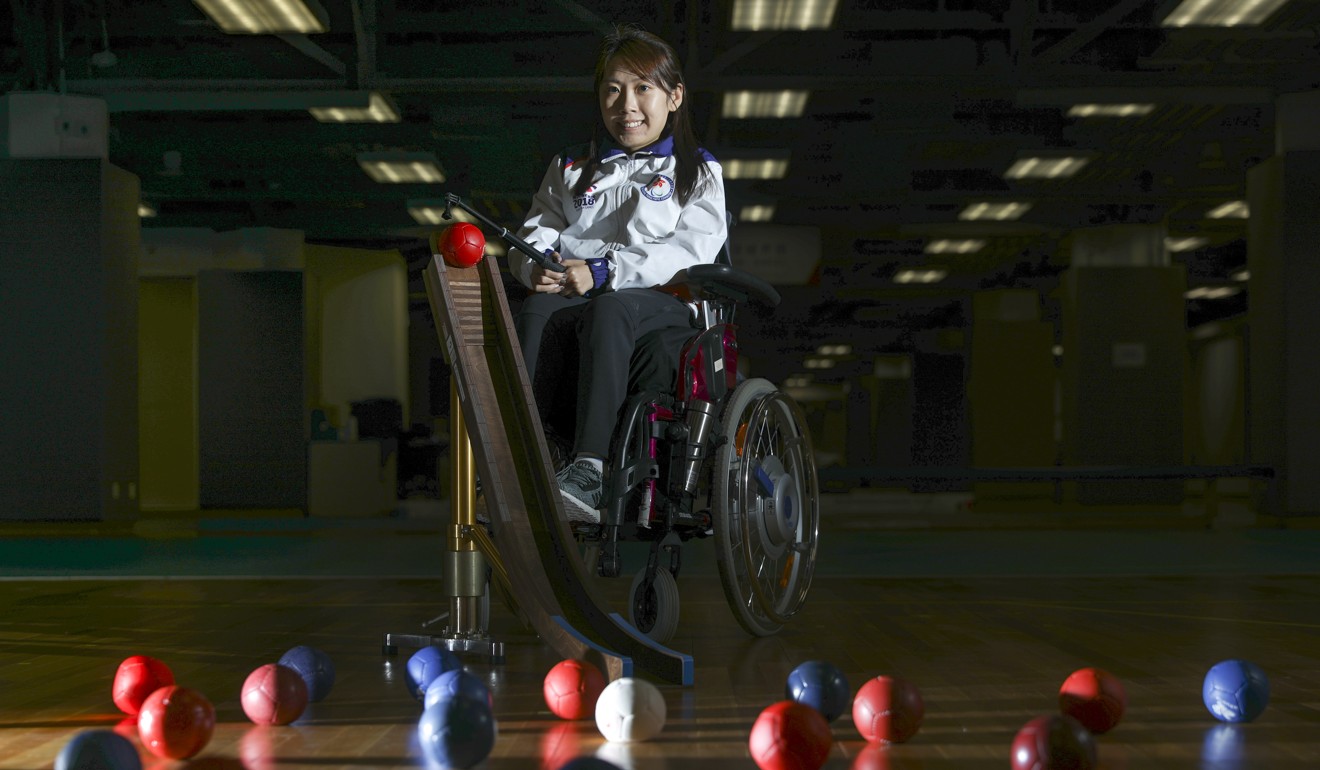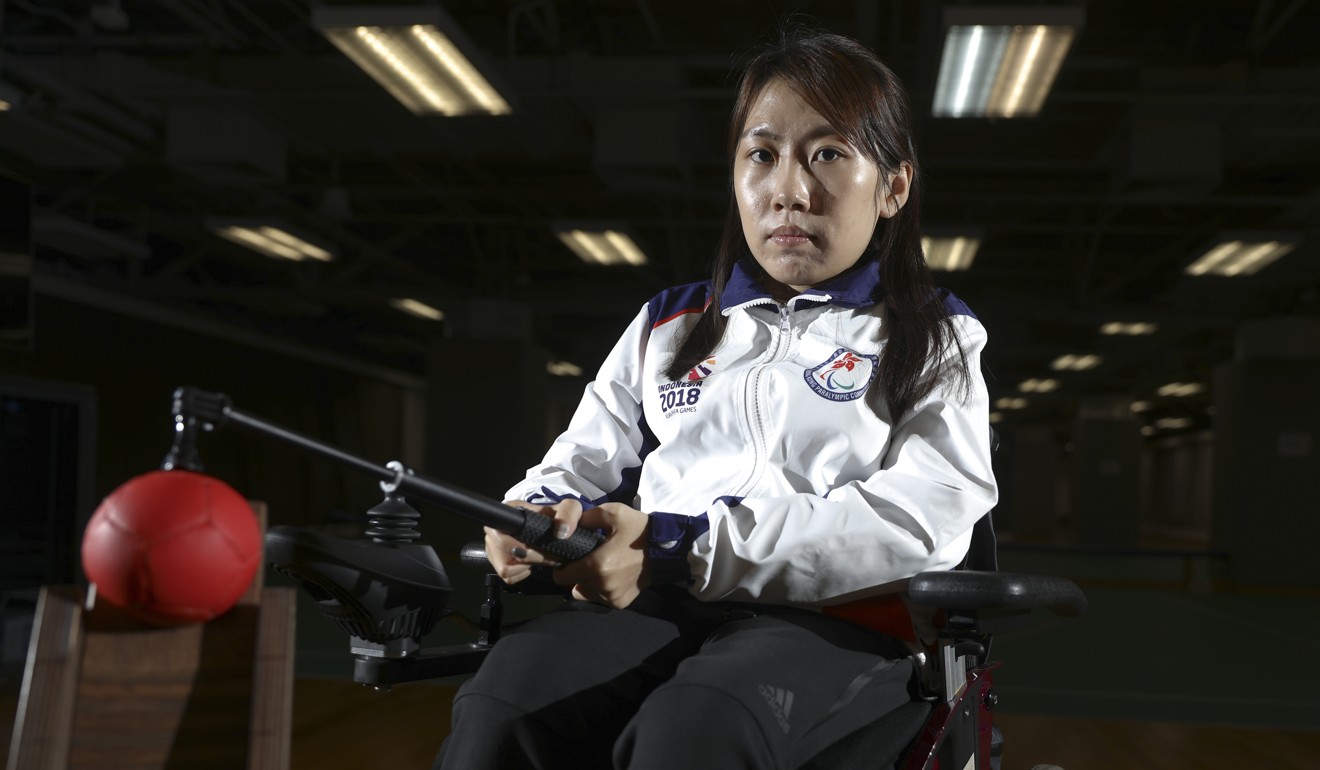
Hong Kong paralympian applies sports dedication to second love – blog on barrier-free restaurants
- Ho Yuen-kei is boccia world No 4 and training for Tokyo 2020
- In her spare time she runs a blog on the most wheelchair accessible restaurants in the city
When the elite wheelchair athlete is not training at the Hong Kong Sports Institute, she is blogging about her second love, food, and restaurants in the city that are accessible for disabled people, or not, as the case may be.
We meet in Caffè Habitu The Table, in Causeway Bay, to discuss both subjects, where Ho gets a cappuccino, her go-to coffee, and crab cakes. She laughs when asked about her favourite food. “I love all food,” she says.

“Initially I was sharing food recommendations with disabled people, but as I kept blogging I realised that I didn’t need to limit my audience,” she says.
My blog isn’t just for people who use wheelchairs, it can be for all
“I received inbox messages from able-bodied people who were seeking barrier-free restaurant recommendations for their family members. My blog isn’t just for people who use wheelchairs, it can be for all.”
Born with spinal muscular atrophy (SMA), Ho is unable to walk and requires a wheelchair to get around. A genetic disorder, SMA results in progressive muscle wasting and weakness. The disease also affects heart and lung function, making it difficult to breathe.
As an elite athlete she spends a lot of time commuting to and from the sports institute in Sha Tin, and, like finding restaurants that are accessible, getting around the city on public transport is something of a challenge.
Hong Kong Paralympian wants to share passion for sports
“In my case, I need someone to help me push or pull open a door because I don’t have a lot of physical strength,” she says. “Commuters in wheelchairs require low-floor buses to get on and off but this isn’t a big problem as a majority of buses in Hong Kong are low floor. Most bus drivers are really nice and helpful.”
The MTR, however, is a different story. Ho visibly shudders over “terrifying” wheelchair aids and stair lifts that move users between levels.
“Some of my friends who got stuck on these monster machines had to wait for firefighters to carry them down. If given a choice we’d rather get off at the next station [with a lift] and make our way back to our destination.”
Ultimately, I decided to continue because my dream was to play in the Paralympic Games
While the city’s stations may need upgrading, Ho says the government has attached greater value to sports in the past decade, allocating more resources to athletes and infrastructure.
For Ho, her journey to the Paralympics and elite athlete status has been an arduous one.
“When I first started [boccia], I was in the BC4 category and used my hand to launch the ball,” she says. “I switched to the BC3 group because my impairment was worsening.
“At that time I thought about quitting the sport to focus on my studies and get a good job. Ultimately, I decided to continue because my dream was to play in the Paralympic Games.”
BC3 athletes are eligible to compete with an assistant and use a ramp to propel the ball into play.
In boccia, players roll six coloured balls as close as possible to a white target ball, known as the jack. One point is awarded for each ball that is closer to the jack than the opponent’s closest ball.
As she prepares to qualify for the Tokyo Games, Ho is training 20 hours a week in Sha Tin, at a new designated training centre for her sport. But she still has fond memories of the performance that catapulted her to the top level.

In 2015, she was competing at the Boccia World Open in Santiago de Cali, Colombia’s third largest city. Before the tournament started, she said her chances of qualifying for the Paralympics the next year in Rio de Janeiro were slim.
“Rio seemed unreachable, and I questioned if I would have to wait for the next Paralympics,” she says.
But then she grabbed the bronze medal in Colombia, an achievement that propelled her inside the world’s top 20.
Her confidence boosted, she made her Paralympic debut and ultimately finished fifth.
One of the city’s first full-time athletes with a disability, Ho has benefited from the HK$70 million (US$8.93 million) that the government has budgeted for 2018-19 for developing sport for people with disabilities – twice the amount set aside the previous year.
Disabled athletes ‘need more backing’, study on training grant disparity finds
The new training facility has made a big difference too. “We no longer have to worry about the risk of injuring ourselves or damaging our equipment,” Ho says. “Practices are also much more effective. In the past, we had to set up each time we arrived at a new training location. Now we can immediately start once we get there.”
The government also launched the Sports Aid Grant for Athletes with Disabilities, which awards elite athletes with monthly grants ranging from HK$1,660 to HK$6,480. Eligible disabled athletes also receive a monthly subsistence grant of up to HK$2,500 through the Hong Kong Paralympians Fund.
Ho says disabled athletes who previously worked full-time jobs to support themselves “no longer have to worry”.
“Full-time athletes can now focus on the sport they love and represent Hong Kong.”
Right now, Ho is preparing for the Hong Kong Boccia World Open, which will be held from May 12 to 20 at Ma On Shan Sports Centre.
The top female and highest ranked Asian in her category, Ho is focused on finishing higher in Tokyo, and insists the best is yet to come.
“This is just the beginning,” she says.

